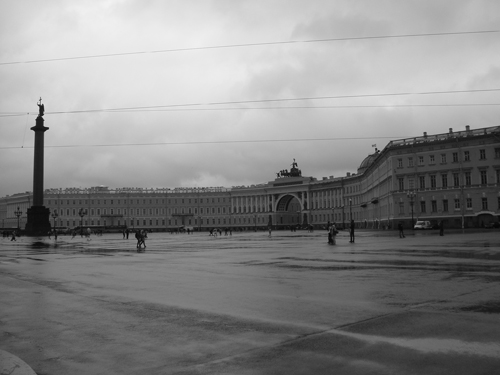Join a community of readers who are committed to Jewish stories
Sign up for JBC’s Nu Reads, a curated selection of Jewish books delivered straight to your door!
Yesterday, Maxim D. Shrayer wrote about young Jews lost in Leningrad. His latest book is Leaving Russia: A Jewish Story. He has been blogging here this week for the Visiting Scribe series about the texture of Jewish memory — about a buried Soviet past which means more to Jewish immigrants in America than it does to today’s Russians in Russia.
Words — especially words of an adopted language — fail to describe how good it felt to take a short break from the turbulent life of a Moscow refusenik family and to spend time with close friends in a city-museum of history. At some point in our stroll through Leningrad we chanced upon a movie set. It must have been an episode about the 1900s revolutionary unrest in the city. We saw barricades, upturned carts and broken-off wheels, all sorts of odd pieces of antique junk, student greatcoats with rows of silver buttons, old-fashioned worker’s caps, and even a whip lying on the cobblestones. The film crew must have been taking a lunch break, there was not a soul on the site, not even a security guard. We walked around without obstruction, trying to put the scene together. Had a unit of Cossacks just rushed by, charging at a group of street protesters? Had the police just carried away the bodies of injured students?

The movie set was just a few blocks from the editorial offices of Aurora, one of Leningrad’s monthly magazines. I left a batch of poems in the hands of an editor with bushy eyebrows, who had looked them over and promised to recommend them for publication. I was still hoping to get my poems published in Soviet magazines, but my efforts would soon come to a halt. In January, political currents would pick me up and carry me, and I wouldn’t resume my publishing efforts until the summer of 1987, already in Italy, already a Jewish-Russian émigré.
In January 1987, while staying with my friend Max Mussel at a ski lodge outside Moscow, I cast the impressions of that magical December 1986 Leningrad trip into a three-part poem. I would ski in the morning and then lounge in bed in the afternoon, composing, while my friend Max read a Russian translation of Look Homeward, Angel. In writing this poem I pictured myself as an American journalist embedded with Soviet college students so as to understand their lives and gain their perspective. In the poem there was a “girl in a short coat” and a “friend in misted-over spectacles.” The characters were painted from an estranged, otherworldly point of view. It was, I now understand, a poem of parting in advance of the parting itself. When I re-read this Leningrad poem today — and also try to work it out in English — I’m struck by the near-absence of either the gruesome Soviet existence or any overtly Jewish references: “games of a tame autumn deity/we who fell for these games/shaking the train station frenzy away/our girl without asking she blindfolded us/with a scrap of Leningrad mist saved under the flap of her coat.” If it weren’t for a mention of the streets of Leningrad and an evocation of the movie set that we had come upon, one couldn’t even tell that the poem described the Soviet 1980s. As a Jewish-Russian émigré who has spent more than half of his life without Russia, I’m surprised when I hear not only notes of farewell but also notes of forgiveness in the poem I wrote in 1987. Whose forgiveness — and for what — could I possibly have in mind?
Maxim D. Shrayer is a bilingual writer and a professor at Boston College. Born in Moscow in 1967 in the family of the writer David Shrayer-Petrov, Shrayer emigrated to the United States in 1987. He has authored over ten books in English and Russian, among them the memoir Waiting for America: A Story of Emigration, the story collection Yom Kippur in Amsterdam, and the Holocaust study I SAW IT. Shrayer’s Anthology of Jewish-Russian Literature won a 2007 National Jewish Book Award, and in 2012 he received a Guggenheim Fellowship. Shrayer’s latest book is Leaving Russia: A Jewish Story, a finalist for the 2013 National Jewish Book Awards. A recent review in Jewish Book Council’s literary review magazine Jewish Book World called Leaving Russia a “stunning memoir” and recommended that it “should be assigned reading for anyone interested in the Jewish experience of the twentieth century.”
Copyright © 2014 by Maxim D. Shrayer
Related Content:
Maxim D. Shrayer is a bilingual writer and a professor at Boston College. Born in Moscow in 1967 in the family of the writer David Shrayer-Petrov, Shrayer emigrated to the United States in 1987. He has authored over ten books in English and Russian, among them the memoir Waiting for America: A Story of Emigration, the story collection Yom Kippur in Amsterdam, and the Holocaust study I SAW IT. Shrayer’s Anthology of Jewish-Russian Literature won a 2007 National Jewish Book Award, and in 2012 he received a Guggenheim Fellowship. Shrayer’s latest book is Leaving Russia: A Jewish Story, a finalist for the 2013 National Jewish Book Awards. A recent review in Jewish Book World called Leaving Russia a “stunning memoir” and recommended that it “should be assigned reading for anyone interested in the Jewish experience of the twentieth century.” Read additional blog posts he’s written for the Visiting Scribe here.